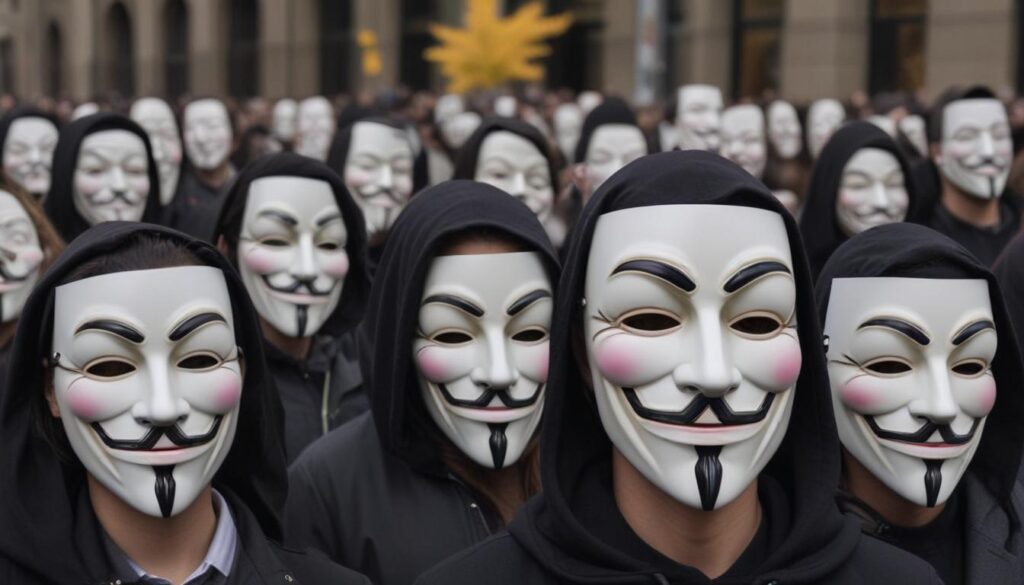Anonymous groups, often associated with the iconic Guy Fawkes mask, have gained notoriety for their hacktivism and cyber activism. These groups, which operate without a centralized leadership, have made headlines for their high-profile cyber attacks and advocacy for various social causes. To understand these groups, it is essential to look beyond their masks and delve into their motivations, methods, and impact.

What Are Anonymous Groups?
Anonymous groups are collectives of individuals who come together to pursue shared goals, often related to internet freedom, social justice, and anti-censorship. The term “Anonymous” is not a name for a specific group but rather a concept that anyone can adopt. This anonymity allows members to participate without revealing their identities, protecting them from legal repercussions and ensuring that the focus remains on their actions and messages rather than on individual personalities.
Key Motivations
Anonymous groups are driven by a variety of motivations, including:
-
Advocacy for Internet Freedom: Many Anonymous groups champion the cause of a free and open internet. They oppose censorship and government surveillance, believing that information should be accessible to all.
-
Social Justice: These groups often support social justice movements, fighting against racism, inequality, and other forms of discrimination. They use their hacking skills to expose wrongdoing and support marginalized communities.
-
Anti-Corporate and Anti-Government Sentiment: Anonymous groups often target corporations and governments they perceive as corrupt or oppressive. They believe in holding powerful entities accountable for their actions.
Methods of Operation
Anonymous groups employ a range of tactics to achieve their goals:
-
DDoS Attacks: Distributed Denial of Service (DDoS) attacks are a common method used by Anonymous groups. These attacks overwhelm a target’s servers with traffic, rendering them inaccessible. This tactic is often used to protest against websites associated with censorship, corruption, or injustice.
-
Data Leaks: Anonymous groups have been known to hack into databases and release sensitive information to the public. These data leaks can expose corruption, unethical practices, or violations of human rights.
-
Website Defacements: In some cases, Anonymous groups deface websites to spread their messages. By altering the content of a target’s website, they draw attention to their cause and disrupt the operations of the target.
-
Social Media Campaigns: Anonymous groups leverage social media to spread their messages and mobilize support. They use platforms like Twitter and Facebook to organize operations, share information, and rally like-minded individuals.
Notable Operations
Anonymous groups have been involved in several high-profile operations:
-
Operation Payback: This operation targeted organizations opposed to WikiLeaks, including PayPal, MasterCard, and Visa. Anonymous launched DDoS attacks against these entities in response to their actions against WikiLeaks, defending the principle of free information.
-
Operation Tunisia: During the Arab Spring, Anonymous supported Tunisian activists by launching cyber attacks against government websites and providing tools to bypass censorship. This operation highlighted their commitment to human rights and democracy.
-
Operation Sony: In 2011, Anonymous targeted Sony in response to the company’s legal actions against hackers who had modified PlayStation 3 consoles. The operation involved DDoS attacks and data breaches, demonstrating their opposition to corporate overreach.
The Impact of Anonymous Groups
The activities of Anonymous groups have had a significant impact on various fronts:
-
Raising Awareness: Anonymous operations often bring attention to issues that might otherwise go unnoticed. Their actions can spark public debates and highlight the need for change.
-
Challenging Power Structures: By targeting powerful corporations and governments, Anonymous groups challenge the status quo and hold these entities accountable for their actions.
-
Supporting Activism: Anonymous groups have supported numerous social justice movements, providing technical assistance and amplifying the voices of activists. Their involvement has bolstered efforts to achieve social and political change.
Criticisms and Controversies
Despite their impact, Anonymous groups have faced criticism and controversy:
-
Legality: Many of the tactics employed by Anonymous groups, such as hacking and DDoS attacks, are illegal. Critics argue that their methods undermine the rule of law and can have unintended consequences.
-
Accountability: The anonymity and decentralization of these groups make it difficult to hold individuals accountable for their actions. This lack of accountability can lead to ethical concerns and collateral damage.
-
Effectiveness: Some critics question the long-term effectiveness of Anonymous operations. While their actions can raise awareness and disrupt operations, they may not always lead to lasting change.
Conclusion
Anonymous groups, with their distinctive masks and decentralized structure, represent a unique form of activism in the digital age. Their commitment to internet freedom, social justice, and anti-censorship has led them to take on powerful entities and support numerous causes. However, their methods and the legality of their actions remain subjects of debate. Understanding the motivations, methods, and impact of Anonymous groups provides insight into their role in shaping the landscape of modern activism. As technology continues to evolve, these groups are likely to remain a significant and controversial force in the fight for a more open and just world.